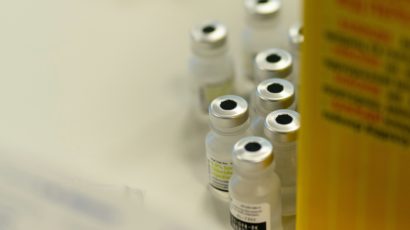Posted by Dr Michelle Wright
Screening for colorectal cancer is recommended for anyone over the age of 50 in Switzerland. Dr Michelle on Health Matters explains the screening options, how to find out if your Canton runs a screening programme, and what to do if they don’t. Visit swisscancerscreening to find out more.
Why it is so important to screen for colorectal cancer
I wanted to talk about colorectal cancer in this show and why it’s so important to consider screening for this.
Colorectal cancer, colon cancer, bowel cancer or cancer of the intestine – they’re all referring to the same thing.
There are 4300 new diagnoses of this type of cancer every year in Switzerland and 1700 people die from it. In fact, 4 in 100 people will develop this cancer before the age of 80.
The important thing to understand about colon cancer is that it usually develops from small growths of tissue inside the intestine known as polyps.
More than 30 in 100 people over the age of 65 will have polyps. But not all of them will become cancerous. And if cancerous changes do happen, the process takes about 10 to 15 years.
The problem is that while these changes are taking place, a person will have little in the way of symptoms. This means that by the time their cancer is discovered, it is often at a more advanced stage. It can be more difficult to treat and the chance of cure isn’t as good.
The good news is that if you have a colon cancer screening test, this can reduce your chance of developing cancer. Any polyps that are found can be removed before the cancerous changes have started. And also, even if a cancer is detected, treatment can be started early. The chance of recovery is much greater.
It’s recommended that anyone over the age of 50 considers screening for colon cancer. People with a family history may be advised to start screening earlier.
What are the screening test options for colorectal cancer?
And there are 2 screening test options that are recommended by the organisation Swiss Cancer Screening.
The first is having what is called a FIT – or Faecal Immunological test. This is basically a chemical analysis of your stools looking for trace amounts of blood.
Colon cancer and polyps tend to bleed before they cause any symptoms. This bleeding is not usually visible to the naked eye. But the FIT test allows detection of even trace amounts of blood.
All you have to do is to collect a sample of your stools at home and this is sent off to the laboratory and tested.
If you choose this screening option, it’s advised to repeat the test every 2 years.
The second way to screen for colorectal cancer is by having a colonoscopy. This involves a doctor looking at the whole of your colon using a flexible tube fitted with a camera that’s inserted via your back passage.
You’re usually given a sedative so you’re not aware of what’s going on during the procedure.
It’s possible to have a ‘screening colonoscopy’ as your main screening test for colon cancer. Or you will be referred for a colonoscopy if you have a positive FIT.
You do have to ‘prepare’ for the colonoscopy by following a special diet for a few days beforehand and by ‘cleaning out’ your bowel by drinking a special liquid.
The big advantages with the colonoscopy are that the doctor is able to see the whole of your colon and look for any polyps or changes. If polyps are detected, they can be removed straight away – during the same procedure. And if all is normal, you usually don’t need to have another colonoscopy for 10 years.
How to get screened for colorectal cancer
Some cantons in Switzerland, including Vaud where I live, have organised screening programmes for colon cancer, with men and women aged between 50 and 69 being sent an invitation to participate. If you visit the website www.swisscancerscreening.ch you can find out which cantons these are. And you can choose which screening test you would like to undertake.
If your canton is not on the list, then my advice would be to make an appointment with your usual doctor yourself to discuss the screening options with them.
Again, visit www.swisscancerscreening.ch for more information.





